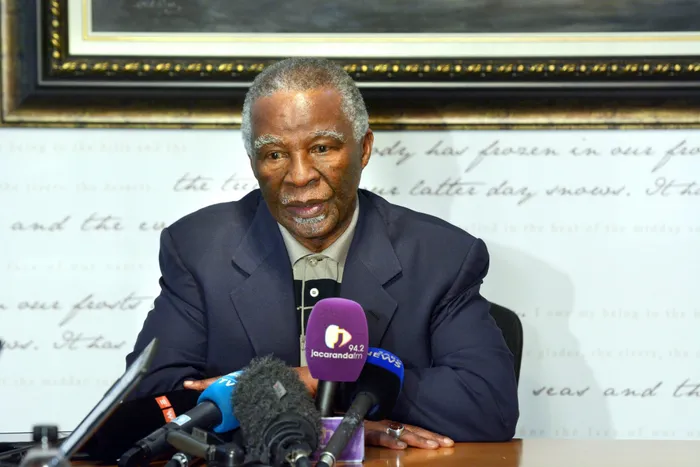
Experts say the recent meeting between Thabo Mbeki Foundation (TMF) and the US Embassy is a sign that the US has lost confidence in President Cyril Ramaphosa and his Cabinet.
Image: Karen Sandison
The recent meeting between Thabo Mbeki Foundation (TMF) and the US Embassy could be a signal of disregard for President Cyril Ramaphosa and his Cabinet, with experts saying this is not a good sign for diplomatic clarity.
On Friday, the TMF announced on X that it had a meeting with a representative from the US Embassy to prepare for a visit from a delegation from the US.
“Today, the Thabo Mbeki Foundation met with a representative from the US Embassy in South Africa to prepare for a delegation from Washington DC that will be paying a courtesy visit to the Foundation next week,’’ said the foundation.
The foundation’s spokesperson Anga Jamela refused to comment and share details about the upcoming meeting.
However, it is believed that the two had discussions about critical issues of mutual interest, including strengthening US-Africa relations, matters of governance and democracy, and continental peace and security challenges - likely touching on the conflict in Sudan and the Democratic Republic of Congo (DRC).
This also comes after the US imposed a 30% tariff on South African exports after President Donald Trump accused South Africa of engaging in racially motivated discrimination against white farmers through its land reform policies, which the US argues violates human rights.
South Africa has denied the accusations, describing them as deeply flawed.
International relations expert, Dr Noluthando Phungula, said although Mbeki had a good reputation during his tenure as President, the US choosing to engage a former President may signal a disregard for the current Ramaphosa administration.
“Choosing to engage a former president may signal a disregard for the current sitting president and his cabinet. This is not a good sign for diplomatic clarity and leaves SA on the backfoot," she said.
Phungula added that the meeting is likely to correct the misinformation and rumours regarding “genocide’’ and discrimination against white farmers. She said Mbeki has also been vocal on the importance of the Africa Growth and Opportunity Act (AGOA) and Africa at large.
AGOA is the US trade law enacted in May 2000 to boost economies in Sub-Saharan Africa by granting eligible countries duty-free access to the US market for certain goods.
“These are the issues I think will be at the top of his agenda,” she said.
Asked if the government was aware and endorsed the meeting, Presidency spokesperson Vincent Magwenya did not respond.
Meanwhile, spokesperson for the Department of International Relations and Corporation (Dirco), Chrispin Phiri, said it is not uncommon in diplomacy for a country to engage non-state actors or eminent persons of a country.
“It is equally understood that non-state actors are not the custodians of a country’s foreign policy, engaging non-state actors in the practice of diplomacy enables one to understand a broad spectrum of issues or sometimes a narrow issue from a different or similar perspective of the State. Information sharing cannot be equated to making foreign policy,’’ he said.
Political analyst Zakhele Ndlovu believes the US government is sending a strong message that it has lost confidence in Ramaphosa’s administration.
He added that the US, with this move, seeks to undermine and embarrass Ramaphosa and the ANC.
“It definitely sets a precedent. The arrogance of the ANC leaders blinds them to the reality that South Africa is not a powerful country and cannot afford to act as if it is powerful. This has huge implications because the government's sovereignty is undermined and compromised,” Ndlovu said.
Political analyst Professor Sipho Seepe supported these sentiments, saying given the frosty relations between the current US administration and Ramaphosa’s administration, the engagement between the TMF and a delegation from the US sends an unfortunate message that borders on undermining Ramaphosa.
Seepe said that it would have been less problematic if such a meeting had been facilitated through Dirco.
Cape Times